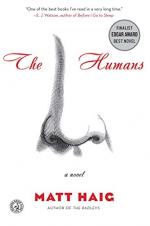
|
| Name: _________________________ | Period: ___________________ |
This test consists of 15 multiple choice questions and 5 short answer questions.
Multiple Choice Questions
1. Where does the narrator follow Gulliver to, when he sees him during school hours?
(a) The train tracks.
(b) The city center.
(c) The river.
(d) The highway.
2. Who is the narrator’s audience?
(a) Humans.
(b) Venusians.
(c) Vonnadorians.
(d) Isobel and Gulliver Martin.
3. What planet does the man in the holding cell say he is from?
(a) Tatooine.
(b) Endor.
(c) Pluto.
(d) Venus.
4. What is the narrator’s first experience on Earth?
(a) Being hit by a car.
(b) Being arrested.
(c) Shoplifting.
(d) Making love.
5. Where does Isobel go, leaving the narrator home alone?
(a) To visit her mother.
(b) To pick up Gulliver from school.
(c) To teach a class at Cambridge.
(d) The supermarket.
6. How does Gulliver characterize the effect the narrator’s arrest for nakedness has had on his life?
(a) It ruined his life.
(b) It made him a curiosity.
(c) It made him a laughing stork.
(d) It made him a celebrity.
7. What does the narrator say he has for the first time after killing Daniel Russell?
(a) A nightmare.
(b) Remorse.
(c) A tear in his eye.
(d) A personal sentiment.
8. Why does the narrator say he does not like wearing clothes?
(a) They are embarrassing.
(b) He prefers glorious nakedness.
(c) They are not geometrical enough.
(d) They chafe.
9. What music does the narrator play, when he feels lonely in the house?
(a) Bizet’s Carmen.
(b) Beethoven’s Ode to Joy.
(c) Holst’s The Planets.
(d) Vivaldi’s The Four Seasons.
10. What is it that makes the narrator sick the day after killing Daniel Russell?
(a) Nostalgia for home.
(b) The air he is breathing.
(c) The chicken Isobel cooked him.
(d) The memory of Russell’s dying face.
11. What are the narrator’s feelings about rain?
(a) It makes him nostalgic.
(b) It soothes him.
(c) It silences him.
(d) He hates it.
12. Where does Isobel Martin say Andrew Martin’s psychological problems came from?
(a) A car accident.
(b) Lack of maternal love.
(c) A childhood illness.
(d) Original sin.
13. What does the narrator say gives him the closest approximation of space?
(a) Tchaikovsky’s concertos.
(b) Palestrina’s psalms.
(c) Mozart’s Requiem.
(d) Debussy’s Clair de Lune.
14. What trait does the narrator say makes up for the humans’ lack of physical attractiveness?
(a) Their gullibility.
(b) Their compassion.
(c) Their rationality.
(d) Their intelligence.
15. What does the narrator say is the most significant of the human languages he will have to master?
(a) The language of silent moments.
(b) The language of eyebrows.
(c) The language of frowns.
(d) The language of sighs.
Short Answer Questions
1. What does the narrator conclude human beings enjoy about music?
2. What causes the narrator to thank someone for the first time in his life?
3. Where is Gulliver’s room in Andrew Martin’s house?
4. How does the narrator characterize the pattern Riemann discovered for the first hundred thousand or so prime numbers?
5. Why does the narrator call Andrew Martin’s mother back, after he hangs up on her?
|
This section contains 542 words (approx. 2 pages at 300 words per page) |

|




